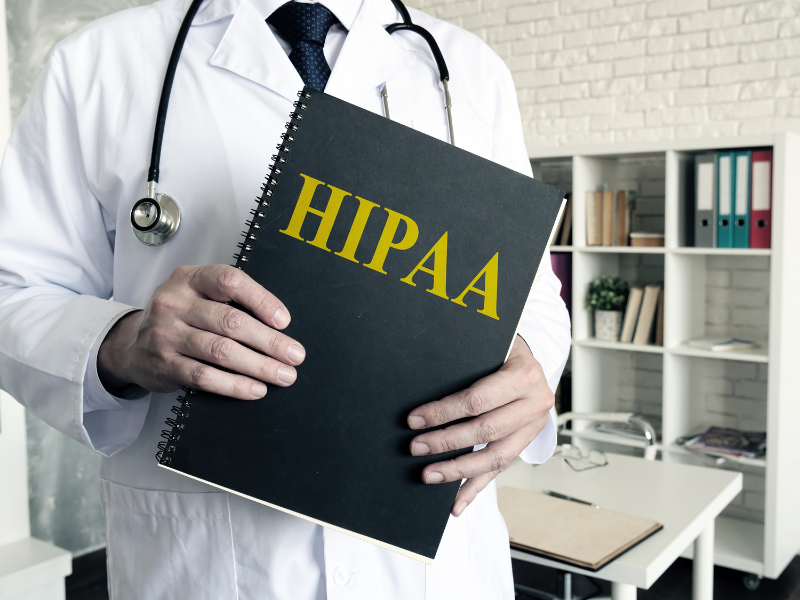As the healthcare industry embraces technology, the need to revisit and update security and privacy regulations becomes even more apparent.
In 2013, the US Department of Health and Human Services (HHS) responded to this need, enacting the HIPAA Omnibus Final Rule to ensure the privacy and security of health information. Published in the Federal Register, the Omnibus Rule addressed the deficiencies in the Health Insurance Portability and Accountability Act of 1996 (HIPAA), offering more flexibility to regulated entities. It also enhanced the privacy and security of sensitive patient information.
But what exactly is the HIPAA Omnibus Final Rule of 2013, and why does it matter? Read on if you want to know the answer.
Table of Contents

What Is the HIPAA Omnibus Final Rule of 2013?
The HIPAA Omnibus Final Rule, implemented on March 26, 2013, brings together several important provisions to strengthen the privacy and security of protected health information (PHI).
The rule incorporates the privacy and security provisions of the Health Information Technology for Economic and Clinical Health Act (HITECH) and section 105 Title I of the Genetic Information Nondiscrimination Act of 2008 (GINA) to create a set of comprehensive regulations.
One of the critical aspects of the Omnibus Final Rule is its expansion of an individual’s rights to access and control their health information. It gives patients the right to receive an electronic copy of their protected health information. It also allows them to restrict the disclosure of their PHI to a health plan for certain purposes, particularly if they have paid for specific services out of pocket.
The rule also enhances accountability by clarifying that business associates, including their subcontractors, are liable for their own breaches, which also means meeting the HIPAA privacy and security requirements. This extension of HIPAA’s guidelines to a broader group of businesses ensures the security and confidentiality of health data.

Privacy Enhancements Under the HIPAA Omnibus Final Rule
The Omnibus Final Rule addresses several perceived deficiencies in the previous HIPAA Privacy Rule. It provides more comprehensive protections for health information by expanding its scope to cover business associates and their subcontractors.
The rule also required modifications of a covered entity’s Notice of Privacy Practices (NPP). This ensures that all entities handling sensitive health data are subject to the same privacy regulations, regardless of their format.
In addition, the rule considered the patient’s right to access their personal health information and keep this private. Individuals now have the right to receive electronic copies of their health information easily.
Additionally, the rule allows individuals to limit the disclosure to their health insurance plans. If a person paid for treatment entirely out of their pocket, they can choose to withhold medical information from their insurance company. This gives them more control over their PHI.
The rule also tightens restrictions on using and disclosing PHI for marketing purposes without individual authorization. Organizations and third-party entities cannot use PHI in most marketing activities without patient consent. Meanwhile, benefits that covered entities receive in kind are not regarded as prohibited compensation. The rule also permits third-party-sponsored communications to patients about drugs they have already been prescribed.
Security Enhancements Under the HIPAA Omnibus Final Rule
The Omnibus Final Rule held business associates directly accountable for complying with the majority of the HIPAA Security Rule, which requires healthcare providers to secure electronically protected health information (ePHI). Business associates are liable for non-compliance with the appropriate administrative, physical, and technical safeguards required by HIPAA.
This enhancement ensures that entities handling PHI on behalf of covered entities adhere to the same rigorous security requirements. By making business associates liable for compliance, the rule raised the overall standard of data protection in the healthcare industry.

Compliance With HIPAA Omnibus Final Rule
Healthcare organizations subject to the HIPAA Omnibus Final Rule must prioritize compliance to protect patient data and avoid penalties. They must update business associate agreements to reflect the expanded requirements and implement data breach notification processes.
Regular risk assessments are necessary to identify potential vulnerabilities and mitigate data breach risks. Proper compliance not only safeguards sensitive health information but also strengthens the trust between patients and healthcare providers.
Impact and Benefits of the HIPAA Omnibus Final Rule
The HIPAA Omnibus Final Rule of 2013 profoundly impacted the healthcare industry, reinforcing individual rights and enhancing accountability.
In a commentary published in Public Health Reports, the Omnibus Rule managed to address some gaps in the Privacy Rule, increasing public trust in data digitization. It also significantly tightened the requirements for business associates, making them directly accountable for failures in securing PHI. The rule also managed to strengthen the individuals’ control over their data.
However, concerns persist on whether the Omnibus Rule adequately addresses health information privacy and security. Tensions between public health interests and individual rights remain.
The Omnibus Rule seeks to balance the demand for health information for public health purposes while protecting individual privacy concerns. Careful policy formulation is still a must to maintain trust in public health data collection.







